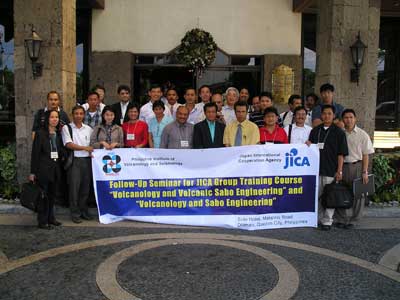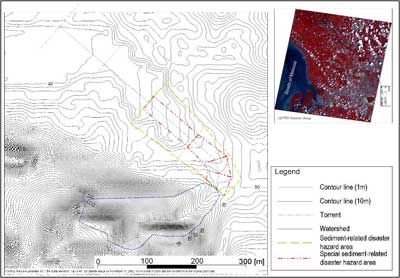| Abstract |
1. Introduction
The Group Training Course in Volcanology and Volcanic Sabo Engineering and the Group Training Course in Volcanology and Sabo Engineering have been provided as part of the technical cooperation project of the Japanese government for developing countries. For 15 years from 1989, JICA has offered these courses to technicians who are engaged in observation of volcanic activities and Sabo works at government agencies and related institutions in the developing countries, with the aim of educating them about observation of volcanic activities to prevent volcanic disasters and theories and technologies of Sabo through lectures, laboratory training, and inspection tours, etc.
From December 6 to December 10, 2004, in the Philippines, Japan International Cooperation Agency (JICA) conducted a follow-up investigation of those who had received any of the aforementioned group training courses.
2. Overview
Subject:
JICA Group Training “Group Training Course in Volcanology and (Volcanic) Sabo Engineering” follow-up investigation team for non-structural measures (Philippines)
Objective:
- To conduct a technical seminar related to non-structural disaster prevention measures.
- To investigate the utilization of the knowledge and skills that ex-trainees acquired from the group training in Japan.
- To exchange opinions about how to further develop the training courses in Japan and human resources who participated in them, and to wrap up suggestions.
Investigation Team:
- Dr. Hiroyuki HAMAGUCHI (Supervisor/ Volcanic disaster prevention; Professor Emeritus, Tohoku University)
- Mr. Shinji YAMAGUCHI (Sabo; National Institute for Land and Infrastructure Management, MLIT)
- Mr. Nozomu YAMASHITA (Planning/ Assessment; Tokyo International Center, JICA)
- Ms. Kumiko FUJITA (Business coordination; International Affairs Div., Planning Dept., Sabo Technical Center)
3. Technical Seminar
Participants:
- Those who received the Group Training Course in Volcanology and Volcanic Sabo Engineering or the Group Training Course in Volcanology and Sabo Engineering and who live in the Asia region.
Place:
- Quezon City, Manila, Philippines
Participating Countries, Number of Participants, (Organization):
- China, 1 people, (Professor, Department of Geography / Northeast Normal University)
- Indonesia, 4 people, (Ministry of Settlement and Regional Infrastructure, Centre of Volcanology & Geological Hazard Mitigation, Volcanological Survey of Indonesia)
- Iran, 2 people, (Watershed Management Office, Jihade e-Agriculture Org.)
- Nepal, 2 people, Department of Mines and Geology / National Seismological Centre
- Philippines, 17 people, (Philippine Institute of Volcanology and Seismology, Department of Public Works and Highways)
Total: 26 people
Schedule/ Contents:
| Mon, Dec. 6 |
Self-introduction
Keynote speech <Volcano> Dr. Hiroyuki HAMAGUCHI, Professor Emeritus, Tohoku University
“Lava lake activity and its accompanying disaster at Nyiragongo and Nyamuragira volcanoes in the mid African plate”
Presentation of hazard maps of each country |
| Tue, Dec. 7 |
Site inspection of the surrounding areas of Pinatubo Volcano |
| Wed, Dec. 8 |
Site inspection of the surrounding areas of Taal Volcano |
| Thu, Dec. 9 |
Keynote speech <Sabo> Mr. Shinji YAMAGUCHI, National Institute for Land and Infrastructure Management, MLIT
“Approach to utilize hazard maps – through the practice in Japan and Nepal”
Reports on Sabo works and observation of volcanic activities, etc. by representatives of the ex-trainees from China, Indonesia and Iran |
| Fri, Dec. 10 |
Reports on Sabo works and observation of volcanic activities, etc. by representatives of the ex-trainees from Nepal and the Philippines
Wrap-up session
All the participants discussed how to strengthen organizations through personnel training, how to improve the group training, and how to establish the network amongex-trainees, and the opinions and suggestions made during the session were wrapped up in a record of discussion.
Closing session |
4. Conclusion
During the supplemental training related to non-structural disaster prevention measures, which was one of the objectives of this seminar, the delegates from Japan introduced the recent volcanic disaster prevention efforts and Sabo works around the world.
During the investigation of the utilization of the knowledge and skills that ex-trainees acquired from the training in Japan, how the ex-trainees utilize the knowledge and skills that they acquired from the training in Japan was investigated. As the result of the investigation, the following facts were found.
- The acquired knowledge and skills are immediately applied in their own countries.
- An ex-trainee takes an active role as a counterpart of JICA technical cooperation project.
- An ex-trainee takes an active role as a counterpart of international projects other than JICA.
- Our group training has contributed not only to cultivation of human resources at individual level, but also to reinforcement of organizations.
We built consensus for the necessity of an information network to exchange the situation of and measures for volcanic and sediment-related disasters in each country, and we reached the conclusion that it is beneficial to build up a network of connections through these training courses.
  |

